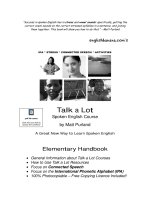SBSD Elementary Homework Guidelines
Bạn đang xem bản rút gọn của tài liệu. Xem và tải ngay bản đầy đủ của tài liệu tại đây (122.53 KB, 2 trang )
South Burlington School District
New Homework Directions at the Elementary Level
Kindergarten through Grade 2:
●
●
Reading with a “Just Right”* Book will be expected each evening.
No other homework will be required.
Grade 3:
●
●
Reading with a “Just Right” Book will be expected each evening.
Homework will be optional for teachers/school though it will focus upon personalized learning,
not on weekly routine work.
Grades 4 & 5:
●
●
●
●
Reading with a “Just Right” Book will be expected each evening.
Homework Assignments will focus upon Project-Base Learning and use Vermont’s Transferrable
Skills as a guide for student independent work.
Independent & Collaborative Projects will also put an emphasis on Organizational Skills..
Homework assignments will focus upon personalized learning, it will not be weekly routine work.
Additional Points:
1. There may be times when a student would benefit from re-enforcement of a basic skill at home
(i.e., letter identification, multiplication facts). In these incidents, the teacher will collaborate with
parents on possible assignments.
2. All elementary schools will communicate with parents on what is covered in various curricula as
well as their child’s academic progress.
3. The elementary schools will provide resources for families who want to have assignments at
home. Math games will be emphasized for understanding math concepts.
*Just Right Book refers to a book at the student’s reading level, teachers will give input into best choices.
Additionally, reading aloud to children (of all ages) is beneficial to increase vocabulary and
comprehension. It is also an excellent activity that enriches family time.
Rationale for Policy Changes:
Our elementary students deserve a childhood and they need to be active and engaged. Many other elementary
schools throughout the area and the country are making the switch to limited homework. It is our hope that
removing routine homework will increase excitement and passion for learning.
● Research does not support a correlation between homework and academic achievement (at the elementary
level);
● Homework limits students’ time to follow their own passions;
● Doing homework may have an impact on the quality of life for families. There is extensive anecdotal
information about how families become stressed about homework completion;
● Children are already in school for a work-day (six and a half hours), we do not believe in the need for
adding a second shift;
● Homework could actually inhibit students from becoming active learners; it can diminish a student’s
interest in education.
TRANSFERABLE SKILLS
Taken from Vermont’s Agency of Education website:
/>The Vermont Transferable Skills Assessment Supports (VTSAS) were developed as a part of a
collaboration between the AOE, Great Schools Partnership, and dozens of Vermont educators,
administrators, and curriculum leaders. VTSAS resources cut across academic content areas, and support
assessment of the transferable skills articulated in Vermont's Education Quality Standards (EQS).
Educators use a diverse array of proficiency-based assessment tools to measure a student's comprehension
of specific elements of learning. Unlike standardized tests that measure how well students have mastered
specific knowledge and skills through a series of questions, performance assessments typically require
students to complete a complex task, such as a writing assignment, science experiment, speech,
presentation, performance, or long-term project, to demonstrate mastery of the topic. Educators worked
collaboratively to develop common assessments, scoring guides, rubrics and other methods to evaluate
student work.
The Sample Transferable Skills Graduation Proficiencies are examples of skills that reach across
content areas and meet the expectations within the Education Quality Standards.
●
●
●
●
●
Clear and Effective Communication
Creative and Practical Problem-Solving
Informed and Integrative Thinking
Responsible and Involved Citizenship
Self-Direction Scoring Criteria









